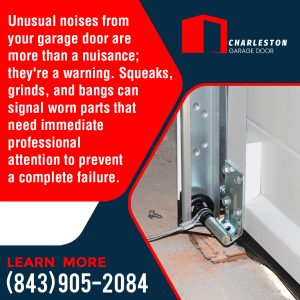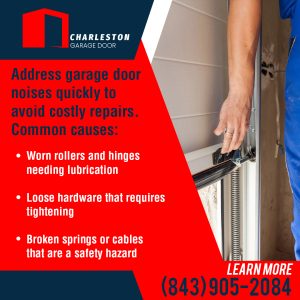Synopsis:
Is your garage door making strange noises? Charleston Garage Door LLC explains why it happens and what to do. From routine maintenance to emergency spring repairs, we offer customized solutions for Charleston homeowners.
Key Takeaways:
- Squeaking usually means a lack of lubrication
- Grinding often signals worn rollers or misaligned tracks
- Loud bangs can indicate broken springs
- Charleston’s climate causes faster wear and rust
- DIY fixes have limits; some issues require professional garage door repairs
- Preventive maintenance helps avoid costly breakdowns
Garage doors are one of the most used and often most overlooked mechanical systems in the home. Over time, all that movement puts stress on parts like rollers, hinges, springs, and the opener system. One of the most common signs that something is wrong? Unusual noise.
In Charleston, SC, where the coastal climate brings high humidity, rain, and salt air, garage door components can wear out even faster. Squeaking, grinding, rattling, or loud banging sounds aren’t just annoying. They’re warning signs that something could be failing in your system.
At Charleston Garage Door LLC, we help homeowners across Charleston and nearby areas identify the root cause of noisy garage doors and fix the issue before it becomes a costly or dangerous repair. Our skilled and experienced professionals provide garage door repair and installation services. We explain why your garage door is making noise, what those sounds typically mean, and what you can do about it, safely and effectively.

Common Types of Garage Door Noises and What They Mean
Squeaking and Creaking Sounds
Squeaking typically means your door’s moving parts need lubrication. This high-pitched noise often comes from hinges that haven’t been lubricated in months, roller bearings running dry, or springs operating without proper lubrication.
Quick Fix: Apply a silicone-based lubricant (never WD-40) to all moving metal parts. Focus on hinges, roller bearings, and springs. Most squeaking resolves immediately with proper lubrication.
Grinding and Rattling Noises
Grinding sounds are more serious and usually indicate worn rollers scraping against tracks, misaligned tracks causing metal-on-metal contact, or damaged garage door opener components. Rattling typically points to loose hardware like bolts, nuts, or mounting brackets that have worked loose over time.
What to Do: Stop using your door immediately if you hear grinding. This noise often means parts are wearing down rapidly and could fail soon. For rattling, walk around your system and tighten any loose bolts or brackets.
Do you need help identifying the source of your garage door noise? Our residential garage door repair services cover all types of noise-related issues in Charleston and nearby areas.
Loud Banging or Popping
These dramatic sounds often indicate serious problems. A loud bang usually means a torsion spring has snapped, while popping sounds can indicate broken springs or cables. Banging when closing often means the door is unbalanced.
Safety Warning: If you hear sudden loud bangs, don’t operate your garage door. Call Charleston Garage Door LLC immediately.
What Causes a Garage Door to Make Noise?
Lack of Regular Maintenance
Most garage door noise stems from neglected maintenance. Moving parts need lubrication every six months to operate quietly. Without it, metal components grind against each other, creating noise and accelerating wear. The average residential garage door operates 1,500 times annually, naturally wearing down components like rollers, hinges, springs, and opener drives.
Charleston’s Climate and System Factors
Charleston’s coastal environment creates unique challenges for garage doors. High humidity causes rust and corrosion on metal components, while salt air accelerates the deterioration of springs and tracks. Temperature changes cause expansion and contraction of parts, leading to misalignment.
Our experience in garage door repair in Charleston, SC, shows that coastal homes often need more frequent lubrication and hardware inspections. The combination of humidity and salt air can cause parts to deteriorate 30% faster than in inland locations. Regular garage door maintenance services help prevent noise problems before they start.
Not all garage door systems make the same types of noise. Extension spring systems (common in older homes) are typically noisier than torsion spring systems. Chain drive openers naturally create more rattling sounds than belt drive openers, which use rubber belts to reduce vibration and noise.
Poor Installation and Component Quality
Incorrectly installed or adjusted garage doors are inherently noisy. Common issues include improperly aligned tracks, incorrect spring tension, and wrong roller types for the door weight. Noise problems often occur due to improper DIY installations or work by unqualified contractors.
The quality of components also directly affects noise levels. High-quality nylon rollers with sealed bearings operate much quieter than steel rollers without proper bearings. Insulated door panels reduce noise transmission significantly compared to single-layer doors.
Why DIY Solutions May Not Always Work
There are a few safe steps you can take to quiet a noisy garage door. But they’re not always enough.
Start with lubrication. Most noise issues come from dry, grinding metal parts. Use a silicone-based spray or white lithium grease (skip WD-40) on hinges, roller bearings, springs, and opener chains or screws. In Charleston’s humid climate, apply lubricant every six months or even quarterly.
Next, inspect and tighten hardware. Vibrations from daily use loosen nuts, bolts, and brackets over time. Use a socket wrench to snug them up, but don’t overtighten.
Clean the tracks with a damp cloth and check for grime or minor dents. If noise continues, you may need upgrades instead of simple fixes. Nylon rollers reduce noise by up to 50%, and insulated garage doors cut sound transmission by nearly 40%.
Know when to stop. If you spot bent tracks, gaps between rollers and rails, or the door binding or jerking, these are signs of a bigger issue. Trying to fix these on your own can be unsafe. Call a professional immediately. Tired of the noise? Our expert techs can quickly identify and fix the issue. Schedule garage door repair in Charleston today
When Should You Call a Professional for Garage Door Noise?
Spring-Related Issues
Garage door springs store tremendous energy. Each year, garage doors are involved in an estimated 20,000 to 30,000 injuries, based on data from the U.S. Consumer Product Safety Commission. The agency warns that DIY garage door repairs, especially those involving high-tension components like springs, can be extremely dangerous and lead to severe injuries. Call a professional if you hear loud snapping sounds, sudden banging noises, or if the door won’t stay up when manually lifted.
Opener and Track Problems
Modern garage door openers are complex systems with safety features that require proper adjustment. Professional help is needed for grinding noises from the opener motor, jerky or inconsistent door movement, or when the opener runs but the door doesn’t move.
For complex opener issues, our garage door remote repair services can diagnose and fix problems with both the opener unit and remote controls.
Misaligned tracks can cause your door to come off entirely, creating serious safety hazards. Warning signs include doors appearing crooked when opening, visible gaps between rollers and tracks, binding during operation, and scraping sounds.
Persistent Noise After DIY Efforts
If you’ve lubricated, tightened hardware, and cleaned tracks but noise persists, underlying mechanical problems likely need professional diagnosis.
Preventive Maintenance to Keep Your Garage Door Quiet
Set reminders to lubricate your garage door every six months. In Charleston’s coastal environment, quarterly lubrication may be beneficial. We recommend annual professional tune-ups that include complete safety inspections, spring tension adjustments, track alignment verification, opener calibration, and preventive part replacement.
Charleston’s climate requires specific seasonal attention. Spring maintenance should inspect for winter damage and moisture effects. Summer monitoring should watch for heat expansion effects on tracks and ensure adequate lubrication during high-use months. Fall preparation includes cleaning debris from tracks and checking opener settings. Winter monitoring should watch for rust and corrosion from coastal moisture.
The Real Cost of Ignoring Garage Door Noise
Neglecting garage door noise can lead to higher repair costs, safety hazards, complete system failure where one failing component damages others, reduced home value, and increased energy costs from doors that don’t seal properly.

Why Charleston Homeowners Trust Charleston Garage Door LLC
We’ve been providing garage door services in Charleston and nearby areas since 2018, building our reputation on quality service and customer satisfaction. Our experience with Charleston’s unique coastal environment means we understand how humidity, salt air, and temperature fluctuations affect garage door performance.
Our technicians carry fully stocked trucks with high-quality replacement parts for garage door repairs in Charleston, SC. We often complete repairs the same day, getting your garage door back to quiet, reliable operation quickly.
What sets Charleston Garage Door LLC apart:
- Same-day service availability throughout Charleston and the surrounding areas
- Upfront, honest pricing with no hidden fees or surprise charges
- High-quality parts and materials designed for coastal environments
- Experienced technicians trained on all major brands and systems
- Local knowledge of Charleston’s environmental challenges and solutions
- 24/7 emergency service for urgent repairs
When you call Charleston Garage Door LLC for a noisy garage door, our systematic approach includes safety assessment, complete system inspection, noise source identification, component testing, reporting of findings with pricing, and professional repair using quality parts and proper techniques.
Noisy Garage Doors? Get Garage Door Services from Charleston Garage Door LLC
Don’t let garage door noise disrupt your daily routine or signal bigger problems ahead. Whatever type of garage door repair you need, component replacement, or complete system diagnosis, Charleston Garage Door LLC is here to help.
Ready for a quieter garage door? Call us at (843) 905-2084 or email us at chsgaragedoor@gmail.com to schedule service. Our team serves Charleston, West Ashley, Sam Rittenberg, North Charleston, Summerville, James Island, Nexton, Goose Creek, Hanahan, Ladson, and nearby areas. We’re available 24/7 for emergency repairs and offer convenient scheduling for routine maintenance.
If you live in Charleston, garage door repair by our experienced professionals will restore peace and quiet to your home. With our commitment to quality service and customer satisfaction, you can count on us to solve your garage door noise problems quickly and effectively.
